January - February 2017
Dear Friends,
Happy New Year! The PiAf Office has been full of excitement with the completion of interviews in search for the 2017-18 fellowship class. In addition, the PiAf Staff has been in preparation for the 2016-17 mid-year retreat! Along with this edition of the Fellows Flyer, learn about how alumni stay involved with Princeton in Africa after their fellowship year!
We hope you enjoy this month’s edition of the Fellows Flyer.
Warm Regards,
Jodianna Ringel
Executive Director
PiAf Connections
Please click below to check out pictures of our Fellows, Alums and other members of the PiAf family meeting up at home and around Africa.
Attachments
Notes from the Field
By Caroline Andridge, 2016-17 Fellow with Clinton Health Access Initiative in South Africa
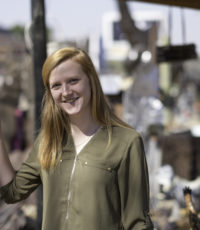
Caroline visits a local artisans market in Johannesburg, South Africa.
She walks confidently into the clinic, her smile genuine and her head held high. A sex worker turned peer educator, she is determined to empower her friends to stay healthy themselves. She speaks emotionally about her life driven to sex work, and the renewed hope and personal agency a novel HIV prevention method brings.
That prevention method is oral pre-exposure prophylaxis, or PrEP, and is the center of the work I do on the HIV Prevention Team at the Clinton Health Access Initiative. It is a pill that reduces the chance of acquiring HIV by over 90 percent, if taken daily. It’s a much-needed and exciting breakthrough to give people who often cannot decide if and when they engage in sexual activity—especially young women—the ability to prevent HIV.
I support two projects at CHAI. The first is the National Department of Health’s rollout of PrEP to sex worker clinics across the country. The second is the She Conquers National Campaign for Adolescent Girls and Young Women. By supporting projects that work primarily with youth and vulnerable females, I’ve learned a great deal about the skills necessary to design, implement, and monitor a project that serves a marginalized population. I helped develop the M&E framework, data collection tools, and communications materials for both projects. Most importantly, I’ve gotten to travel around the country to visit health facilities and engage with clinicians and counselors passionate about this work.
The women I’ve met on these visits humanize my passion for service, policy, and international development. As my technical knowledge of project development and monitoring grows in this roll, so too does my appreciation for the complications posed by resource constraints, technology disconnects, and issues of access. I am grateful for and humbled by the continued opportunities to contribute to such a passionate, skilled team at CHAI and engage regularly with the men and women committed to delivering health services to often ostracized populations.
After researching and writing about global health and international development at a think tank for two years in Washington, DC, this practical experience is exactly what I was looking for. Assisting in concrete project implementation exposes several facets of development that are often over-simplified in research. I’m excited to continue learning and growing in this practical setting and am committed to remembering the living, breathing humans that the research turns into numbers.
This experience has also given me valuable insight into myself. Moving to South Africa without knowing a single soul, you must quickly become comfortable with your own company. With ample time for self-reflection as I’ve settled in, I’ve sought new ways to challenge myself personally and socially. Over the past six months, I’ve managed to talk myself into abseiling, cliff jumping, intense mountain hikes, surfing, and a solo backpacking adventure. Each new experience teaches me something about myself and helps me fall in love with this country even more. Cheers to a new year filled with diligent work, new experiences, and bungee jumping in Soweto.
Notes from the Field
By Regine Ankoma-Bempong, 2016-17 Fellow with Imani Development in Malawi
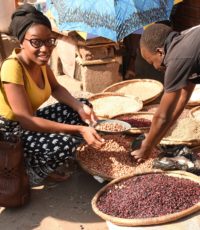
Regine in the Blantyre market.
Before I left for Malawi, I mulled over the degree of connectedness I would like to have with my new home. I questioned if it would be fair to myself and the people around me to invest in our engagements and then leave after a year. I was born and raised in Ghana and pride myself in having lived on the African continent all my life except for the 4 years spent in the US for college. In my lifetime, I have traveled to other beautiful parts of the world. However, until taking this post in Malawi, I had never visited any other African country.
Before I hopped off the plane at Chileka Airport, I had decided to be cautious; to get close but not too close. When I arrived, I met Anthony, the outgoing Imani Fellow, who spoke kindly of everyone he had met and the genuine connections he had made during his fellowship year. He was friends with Malawians, expats, colleagues, and many others. After listening to him, I began to struggle with my initial decision to remain distant.
It has been five months since I moved to Malawi and I am happy to say that I have failed gloriously at this idea of cautious relationships! My natural gravitation towards storytellers and stories of which everyone in the universe actively or passively engages has led me to conversations with many strangers now turned friends. One such person is Unity, my ever punctual taxi driver friend whose tales span across clients from different countries. He has never traveled outside of Malawi, but his stories tell me of delightful and terrifying places he has seen through the borrowed eyes of his passengers. When I wonder if my work or actions can significantly impact the lives around me, I think about the lady with flawless lipsticks at the cash register in Superior, one of the grocery stores I frequent, whose smiles of recognition always brighten my day. And I realize the little I do may go a long way for some.
In my workplace, I have also failed at cautious relationships. I hug some of my colleagues when I walk through the doors in the morning, greeting most with the cheeriest “Mwazukabwanje” I can summon or a simple “good morning” when my Chichewa fails me. In the past few months, I have celebrated two Malawian weddings with Imani and danced around the couples with fellow Imani staff as we performed perekani-perekani (a cash gift dancing celebration for the couple). In the course of my work on writing proposals and analyzing data from surveys conducted I have often shared frustrations and accomplishments with colleagues. And I have come to understand that it’s hard not to call people with whom you have communed in the universal languages of frustration, joy, marriage and accomplishment, friends.
Notes from the Field
By Ryan Collins, 2016-17 Fellow with International Rescue Committee in Kenya
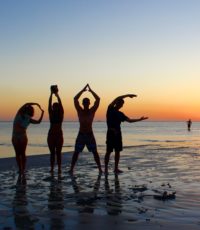
East Africa Fellows form a human PiAf tribute in the Zanzibar sunset.
There’s a Cold Stone Creamery three blocks from my house. They just opened a Burger King that’s about a five-minute ride from here. I can walk to a Subway, take a bus to a KFC, and get Dominos delivered. I feel confident when I tell my family that I’m safe in Kenya, because I’m normally writing to them from a coffee shop over a ginger-orange scone or some other equally obnoxious pastry. The rural fellows usually laugh at me when I complain about how often my Uber drivers get lost here. Their villages don’t have cars.
Nairobi is a nice place. Some days, I find myself taking cars from mall to mall, taking in Nairobi’s luxuries and only meeting Americans and the occasional Norwegian. Sometimes it feels like I moved to Cleveland instead of Kenya.
But there is a city here. There’s life and culture and grit hidden away in every corner. You just have to go looking for it. Two blocks away from the mall where you can watch La La Land in 3D, there’s a bustling market that stocks everything from second-hand machetes to live goats. Hidden behind some dirt road car washes, far away from the nightclubs and hookah lounges, there are backyard bars furnished with nothing but picnic tables, two dollar beers, and the neighborhood band. There are chaotic groups of buses jammed into downtown alleyways. All of them are adorned with custom painted murals of Jesus Christ or Ice Cube and all of them can take you anywhere in the country for three bucks.
I’m not forced to confront Nairobi the way some of the other fellows have to confront their villages or cities. This place doesn’t hit you over the head like a cold bucket shower. If you wanted to, you could live here without ever leaving your comfort zone. Many people don’t. On my bad days, I don’t. After a day filled with workplace disputes and relationship problems, I’m happy that I can go buy a sleeve of Double Stuff Oreos to stuff my face with and calm the nerves.
But if you want to find the unique or the challenging here, it’s on you to seek it out. Getting outside of the bubble is a daily struggle. Fighting against the allures of comfortable, cappuccino filled living is tough and I often default to the easy life if I don’t push myself.
It’s worth the effort. Forcing myself to get lost in all areas of Nairobi has produced my most memorable moments here. If you’re willing to put in the extra effort to leave Burger King, take a few turns down some back roads, and wander down a dimly lit alley or two, you can always find a place serving Ugali and Nyama that’ll beat a Whopper any day.
Notes from the Field
By Jantsan Damdinsuren, 2016-17 Fellow with Maru-a-Pula in Botswana
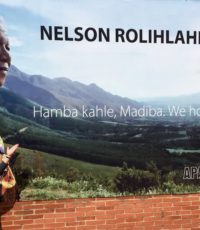
Jantsan at Apartheid Museum in Johannesburg.
In my 10th grade World History, we were given an assignment to research a historical figure whose contributions made a significant impact on society. With little knowledge on Apartheid, I chose the towering Nelson Rolihlahla Mandela as my historical figure and learned about his lifetime commitment to freedom and equality.
The story of how a Xhosa boy became the hero of the freedom struggle inspired me to learn more.
Fast forward 8 years and I find myself teaching about Apartheid. The architects of Apartheid invented the system as a means to maintain white domination over economic and social aspects of daily life, while institutionalizing racial discrimination.
I kept one theme throughout my lessons – contributions of young people to end the apartheid system – in hopes to encourage and inspire my students to partake in something larger than themselves. I truly believe that when a community views its young people as resources and welcomes their participation, the youth become empowered and positively engaged in their community. This creates inclusive, safe and healthy communities.
It was youth led by Nelson Mandela, Oliver Tambo, and Walter Sisulu who were determined to radicalize the staid leadership of the ANC with the founding of the ANC Youth League in 1944. It was youth who carried on the struggle when the ANC was banned and the entire leadership was imprisoned or exiled. It was youth like Steve Biko and 20,000 students who participated in the Soweto Uprising against the oppressive government and continued the struggle for freedom in the 1970s and 1980s.
The turmoil of the years of unrest, instability, and sanctions in the apartheid years have taken their toll on an entire generation of South Africans. South Africa continues to struggle with the legacy of apartheid policies that resulted in widespread poverty, inequality, and the disenfranchisement of the majority of the population.
In the two decades since the end of Apartheid, there has certainly been progress worth celebrating. This progress has created an interesting dynamic in South Africa’s youth, the first “free-born” generation. It is this generation that will overcome the many lingering issues and aftereffects of Apartheid. Recent studies show that Africa’s growth prospects are bright and by 2040, most African countries will be middle-income, equipped with the largest workforce.
Princeton in Africa has given me the opportunity to foster relationships with my students, whom I have no doubt will contribute to Nelson Mandela’s vision for a free, just and peaceful society for all.
Notes from the Field
By Katharine Eger, 2016-17 Fellow with the BOMA Project in Kenya
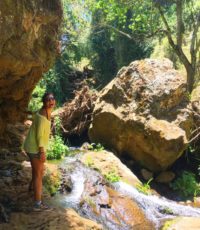
Katharine chasing waterfalls in Ngare Ndare, a national park outside of Nanyuki.
Each morning on my drive to work, I stop in the middle of the road to buy a copy of Daily Nation from a deaf man in a blue jacket. Bodabodas zoom by as we exchange smiles, handshakes, and 30 shillings for the newspaper in the middle of the intersection. I read it, mainly to learn a little more about current events, but also to gain the small pleasure of pestering my coworkers and friends: “Who is so-and-so again?” “What does this-or-that imply?”
My first day in Nanyuki, a soon-to-be friend informed me that politics is Kenya’s “national sport.” They were not wrong. Current events imbue every aspect of daily life as a source of conversation and connection. Debates and disparagements, usually surrounding the abject corruption employed by politicians, fill lunch-time discussions. Despite my pre-Kenya reading list, it was not until I was enmeshed in the system that I began to scratch the surface of what goes on here.
What strikes me when reading Kenyan national news, is its international scope. Trouble in Senegal? Covered. Ankara extends its state of emergency status in Turkey? I’m likely to first find out through a Kenyan journalist. Even the banalities of public urination take on a global focus: ever the hard-hitting news source, Daily Nation ran a story on a particularly combative liquid-repellent paint used in Southern Pennsylvania subway stations that sprays urine back into the faces of deviant offenders.
Given the global focus of the news, practically every aspect of the US elections was thoroughly broadcasted and, given the nature of Kenyans, on finding out my nationality, they had plenty of advice for me to tweet to our President-Elect.
Especially vocal in his support of Hillary Clinton was a co-worker who happened to be the namesake of the Secretary’s husband. Bill-Clinton Owiti not only wanted Hilary Clinton to carry out President Obama’s legacy, but he wholeheartedly believed that a woman president of the United States would mean better things for the world. Day in and day out leading up to the election Bill-Clinton would spout out stats, polls, and a “You were sure to vote, yes?” after each unsolicited “fun” fact. On November 9, he was genuinely flummoxed by the Electoral College, berating me as if I was one of the founding fathers who established it.
While few people can claim their literal name has skin in the game, staffers at Daily Nation still took it upon themselves to decipher what this new administration will mean for the planet. Forty pages were dedicated to the President-Elect and I quickly realized that my role as a Princeton in Africa fellow pivoted from that of observer to one of ambassador. Now, more than ever, is the time for me, as an American to flaunt our interconnectedness and educate myself – not just about the US inauguration and Pennsylvania’s urine-reflecting paint – but about the role of the US in the world.
Notes from the Field
By Meyris Montalvo, 2016-17 Fellow with Comprehensive Community Based Rehabilitation in Tanzania
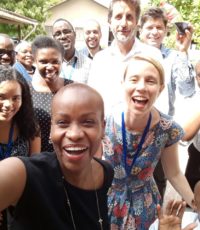
Meyris (first on left corner) with some of her colleagues.
As any child growing up, right through my early college years, I had an endless mental list of potential careers. It included popular choices like doctor, teacher and lawyer to more unique ones like dancer, astronaut, and scientist. After steadily distilling the list, I realized that I was passionate about international development, and I graduated with the opportunity to work in the sector through a PiAf fellowship in Tanzania.
Fundraising and maintaining donor relations is necessary for most development organizations. I looked forward to using my fellowship to figure out whether this type of work would be right for me. Now, more than four months into my fellowship, I have more questions than answers: Do I really like this? Is this the type of work I see myself doing long-term?
As a Business Development Officer, I work with a small, but mighty team to fundraise for the organization and engage with donors. This work requires endless patience, flexibility, and the ability to have a good laugh with my team about how donor reports are going to drive us crazy.
Uncertainty has crept in as I find myself sitting behind my desk, fielding donor requests for data that takes me weeks to track down. Maybe it’s sitting behind a desk most of the day, the sometimes unrealistic donor expectations, or the instances of disorganization that NGOs face, but I’ll be honest and say that I’m confused (and that is okay!). The reality is that most development jobs require a lot of desk work, which is sometimes boring and repetitive. However, I know that desk work is just as important and impactful as “field work.” My team’s work allows thousands of Tanzanians to receive free treatment, covers the salaries of nurses and doctors, and supports outreach services across Tanzania.
So, when I’m down and frustrated with the stresses of my work, which inevitably causes me to doubt if this is The Job for me, I think about the many positives that keep me going every day. I’m in a privileged position to be working for a Tanzanian organization that provides the best disability services in the country. I’m fortunate enough to work with a team who is passionate about the work we do and makes the hard days much more bearable. I’m also lucky to work at the CCBRT Disability Hospital, allowing me to see the patients we treat and understand how the work we produce translates into the services the organization provides to Tanzanians.
One lesson that I’ve learned is that it’s okay to be confused and this fellowship year won’t answer all of my questions about the future. What I do know is that I see myself living, working, and growing in Africa for many years to come. For now, I’ll continue learning as much as I can from my post, enjoying my time in Tanzania, reflecting on where I see myself in the future and how I can help change development practice and policy across Africa.
Notes from the Field
By Anchal Padukone, 2016-17 Fellow with Mpala Research Centre & Wildlife Foundation in Kenya
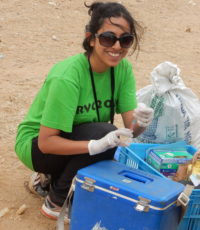
Helping to fill vaccines and organize chemical wastes at a rabies vaccination station during Mpala’s campaign in Laikipia… and sometimes, being mistaken for a “daktari” (Kiswahili for doctor or vet).
When I first arrived at Mpala as an undergraduate research assistant, I was in awe of this expanse of savannah-bushland and the rolling hills in the horizon. Born and raised in urban Sri Lanka and India, I could never have imagined living somewhere like this for more than a week. I was told I would learn to “read the landscape”. Soon, I was monitoring vegetation and tracking animal movements. Giraffes, elephants and even endangered Grevy’s zebra became regulars on my morning drives to work.
As a PiAf Fellow at Mpala Research Centre, however, I wear many hats. No longer am I collecting and analyzing data from the same three field sites – instead, my work is varied, more people-oriented, and has expanded my horizons in Kenya with all the places it has taken me! Among other things, I work with scientists to write textbook excerpts and articles for our newsletter and online media, and coordinate Mpala’s outreach and educational programmes. One day, I could be busy in the office, designing and writing content for our annual calendar. The next, I could find myself in the field, helping to demonstrate plant sampling methods to students.
It has been just the post-college experience I had hoped for. Before committing to a graduate programme in the sciences, I wanted to explore my other interests – science communication, applied conservation, community development. My fellowship has not only given me numerous opportunities to do so, but has also exposed me to an incredible network and influenced the kind of scientist I would like to be. My fellowship has taught me these main lessons:
Making research relevant: While working with vets and scientists to coordinate our annual Laikipia Rabies Vaccination Campaign, I observed how research on the population densities, movement patterns and disease burden in domestic dogs in our area informed our campaign strategy. I’m currently attending a biodiversity informatics workshop, through which participants will harness data on small carnivores to develop useful models for governmental conservation planning. The work I do as a fellow encourages me to think about how to integrate ecological research into land management, conservation and public health decision-making.
Creating training and mentorship opportunities: I was fortunate to have done independent research under a faculty mentor as an undergraduate, but many institutions in Kenya and India lack the resources to provide motivated students with a similarly rigorous and practical education. At Mpala, I’ve learned from researchers who care deeply about involving local students in their projects and training them to be confident, effective communicators (an increasingly vital skill that is often underemphasized in science courses).
Catching them young: Mpala educators support Conservation Clubs in 12 local primary schools. Each week, the Clubs play games, do experiments, and write mini-reports. Guided by their teachers, they implement science-based conservation projects – from installing barriers to soil erosion in their communities to halting the spread of an invasive species via biocontrol. By working with the Clubs and absorbing their philosophy of experiential learning, I have learned how to make science more relevant to young students.
Notes from the Field
By Lauren Schmidt, 2016-17 Fellow with International Rescue Committee in Uganda
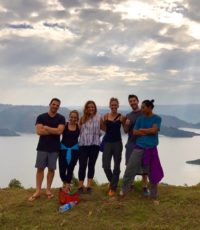
Lauren hiking around the beautiful Lake Bunyonyi with other Fellows and friends.
I arrived in Kampala the night before I was expected to start work and was welcomed by my supervisor rapidly packing essentials into a backpack. She had just received word that she would need to go to Yumbe, a remote village at the crux of Uganda’s Congolese and South Sudanese borders, to help establish a new refugee settlement. Having spent the past few months in Nepal with little access to internet, I was unaware that the peace treaty between Salva Kiir and Riek Machar, South Sudan’s President and Vice-President respectively, had rapidly disintegrated- driving hundreds of thousands of South Sudanese families to Uganda, in search of the peace and security they failed to find in their homeland.
Over the next few months, I would sit in meeting after meeting, watching the number of arrivals soar and humanitarian actors grapple with the overwhelming- and seemingly impossible- demands of responding. Over 383,000 refugees arrived in Uganda between July 1st and December 16th, bringing the nation’s South Sudanese population to an astounding 644,000 (comparable to the city of Baltimore). The new settlement in Yumbe, Bidibidi, had become the second largest refugee settlement in the world at 272,206 refugees within a matter of months.
The International Rescue Committee grew in response to the influx and our staff more than doubled during my first three months here. Despite the increase in human capital, we remained severely shorthanded and I continually found myself executing tasks for which I was, by any standard, under-prepared and under-qualified. From calling our protection program to writing UNHCR proposals, each day presented formidable professional and personal challenges. Though overwhelmed, I was extremely fortunate to be surrounded by the IRC’s extremely dedicated staff who worked tirelessly (often 17 hour days) without lunch breaks and without complaints throughout the early months of the response. They ensured the vulnerable population had access to health facilities, shelters and legal services. I was constantly inspired by their leadership and creativity and benefitted tremendously from their willingness to share experiences and insights as I grew into my new role. Modest, yet steady improvements- such as a new water tank at a health facility or the establishment of a women’s center- witnessed on subsequent trips to Yumbe galvanized me to continue to contribute to this team to my best ability.
Though much progress is being made, the scale of the emergency continues to increase at alarming rates as daily arrivals persist in the thousands (conservative estimates predict at least 350,000 will seek refuge in Uganda throughout 2017). With Bidibidi at operational capacity, two new settlements have had to open over the past two months to accommodate the influx. Most actors have surpassed their financial and programmatic capacities, jeopardizing quality service provision and reinforcing the raising of funds and awareness for this severely under-reported crisis as a critical priority. I greatly look forward to continuing to work alongside and learn from my colleagues and our beneficiaries over the remaining six months of my fellowship in service of such aims.
Notes from the Field
By Philile Shongwe, 2016-17 Fellow with African School of Economics in Benin
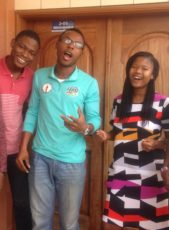
Philile rehearsing with members of the ASE Singing Club.
It’s been a couple of weeks since I returned to Benin after spending some time with family and friends for the holidays. Predictably, everyone was eager to find out about my experience in Benin thus far and the people with whom I spend most of my time. I genuinely enjoyed most of these conversations because by sharing my experiences with others, I started to really appreciate how well-adjusted I had become to my life and work at the African School of Economics (ASE). More than anything, I appreciated how much my work allowed me to interact with different kinds of people that I depend on in my daily life and make ASE a special place to me.
Officially, I work as a Bilingual Research and Administrative Assistant at ASE. I edit research proposals, write literature reviews and work in small teams to complete specific tasks for larger research projects. I also work in the Communications Department to make sure website and newsletter content is up-to-date. The university itself is unique in that it not only seeks to give students high-level training in Mathematics, Economics and Statistics, but it is also provides this training entirely in English, in a French-speaking country. Although English instruction provides a number of great opportunities for our students to distinguish themselves from their peers in other Francophone countries, it also poses a huge challenge as many of them have to take Master’s level classes entirely in English for the first time in their lives. Part of my job at ASE (and something I take a huge amount of pride in) is helping students improve their English speaking and reading abilities so that over time, the idea of being in an English-speaking environment is less daunting and they can either pursue further studies in English or work in English-speaking countries. In addition to their classes, I teach a compulsory English class twice a week and recently started a singing club that has given me a chance to get to know the students a little bit more. Initially, when I was thinking about starting the ASE Singing Club, I wanted to introduce a fun activity that would create a sense of community outside of class and help the students practice their English. In a very short time, the singing club has become an unexpected celebration of culture and the arts at ASE. Our first performance was at ASE’s inaugural graduation ceremony on December 17th, 2016, and we hoped to inspire more musicians and artists through specific scholarships for African artists at ASE. I am thrilled to be part of this initiative and look forward to seeing how the group grows and enriches the ASE community in the coming months!
Notes from the Field
Alumni Update: Current Alumni Involvement
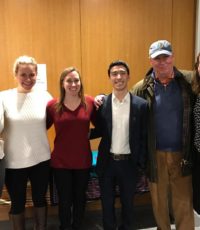
Left to Right: Hilary Robinson (2007-08 Fellow with Plan International in Uganda), Michelle Spada (Princeton in Africa’s Program Manager and 2012-13 Fellow with the International Rescue Committee in Liberia), Max Sugarman (2014-15 Fellow with The Kasiisi Project in Uganda), and Jim Robinson (Princeton in Africa’s Board President) after interviewing potential candidates for the 2017-18 fellowship class.
The network of former Fellows contributes greatly to Princeton in Africa’s motto: Service for a Year. Commitment for a Lifetime. Princeton in Africa relies on the support of alumni to search for new fellowship classes, facilitate orientations and mid-year retreats, and stay current with employment, training and funding opportunities on or connected to the African continent. January has been a particularly active month for PiAf alumni! About 20 alumni volunteered their time to interview potential candidates for the 2017-18 fellowship class. Alumni provide invaluable insight for potential applicants about the reality of a PiAf Fellowship. In addition to interviews, we have three alumni who have signed-up as Alumni Coordinators for the 2017 Fellows Mid-Year Retreat in Moshi, Tanzania. Thank you to Shameika Black (2012-13 Fellow with Olam International in Gabon), Joan Larbi (2015-16 Fellow with African Leadership Academy in South Africa), and Chris Speers (2012-13 Fellow with Maru-a-Pula in Botswana). We are also excited to announce three new positions in our Alumni Working Group:
Co-Chair for Webinars: Grace Perkins, 2014-15 Fellow with Global Shea Alliance in Ghana & Lorna Morris, 2014-15 Fellow with UN World Food Programme in Rwanda
Chair for Digital: Tyler McBrien, 2015-16 Fellow with Equal Education in South Africa
Co-Chair for Social: Bjorn Whitmore, 2012-13 Fellow with Lutheran World Federation in Burundi & Lavina Ranjan, 2014-15 Fellow with Maru-a-Pula in BotswanaWe are extremely grateful for the ongoing efforts from our alumni! If you would like to get more involved in alumni activities, please reach out to Emily Harris (emilyroseharris@gmail.com) or Mike Scharff (michaeljscharff@gmail.com) and also look-out for emails for ways to be involved! Can’t wait to see all of the amazing work our alumni will do in 2017!




